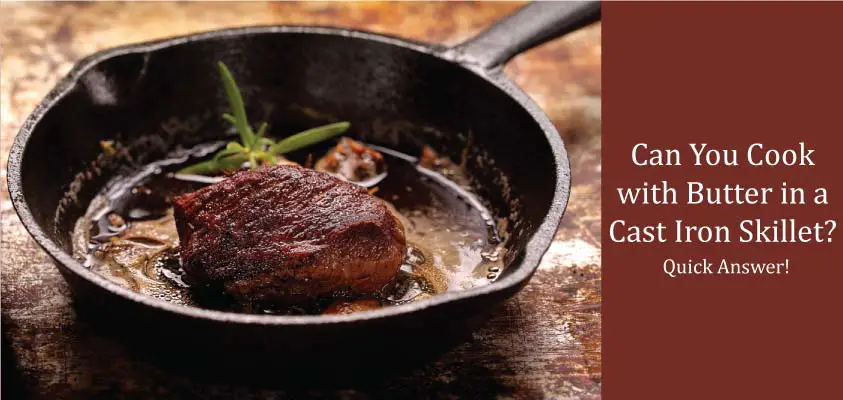Butter is an excellent way of bringing versatility to your cooking but only when used in the right processing.
Using butter in cast iron skillets is more familiar than with non-stick pans or similar cookware where additional fat or grease is unnecessary.
But, the most common problem people face while cooking with butter is burning, and thus, their wish of cooking like a chef remains a dream.
Out of frustration, so often the question comes, can you cook with butter in a cast-iron skillet?
Yes, cooking with butter is lovely to incorporate any cookware, including a cast-iron skillet. But, one thing that should be kept in mind is that the smoke point of the butter should not be exceeded, which can turn your overall food toxic.
Often, one may obtain better results by combining butter with some high smoke-point oils or by cooking using less heat.
Let us explore!
Do you Use oil or Butter in a Cast-iron Skillet?
Most definitely! Butters are indeed made to be used in cooking and therefore enhance the quality, taste, texture of your food.
Most of us are bounded to use oils for most of our cooking purpose, but many people have exceptional attention to butter. And one of the biggest reasons behind it is the smell of the butter coming out of your favorite dish that individuals crave.
That is to say, it is clear is that butter is something that you can use for cooking. But does it means that you use butter every time in your cast iron skillet?
Well, the article is specified with cast iron factors. We will be prioritizing it mainly as the cookware to be used with butter. With that said, butter is sometimes not accepted for your cast iron skillets for the best results.
And, that includes the time of the seasoning of your cast iron where one shouldn’t be going for butter.
Butter and olive oil are not suitable for the initial reasoning periods, but they are marvelous for cooking.
While seasoning your cast iron, all you should do is choose an oil with the very smoke point, place your iron skillet upside down inside an oven, and heat for 1 hour. Then, let your skillet cool down inside the range, and then it is ready to be taken out.
How do you Keep the Butter from Burning in a Cast-iron Skillet?
There are many tricks and tips in avoiding the burning of your butter that many don’t know. So today, we will be helping you to efficiently use butter in a cast-iron skillet, so that, next time when you go cooking with butter, you can be wholly worriless or save your extra time of spotting the cooking.
One of the most common tips that others give is not to use butter in the first place while cooking foods that require prolonged healing sessions. But we will not be giving any such idea as it will not make your time worthy with us.
Some of the strategies of using butter and keeping it from burning in a cast-iron skillet are as follows:
- Use a wooden spoon for the stirring purpose! Stirring the butter at regular intervals throughout the extended periods of cooking will help them stay away from burning and therefore retain their quality.
- Use oil just after pre-heating your cast iron skillet to protect the butter from direct exposure to heat.
- If you want to cook your food using butter, first apply oil and then go for the butter right before adding your food for the cooking. And, if you want to use fat for the same purpose, do the exact opposite to this.
- If you are already aware that your butter will exceed its smoke point for the particular dish you are cooking, you need to remove that pan from the heat at the end.
- Also, if you notice any unconditional burning of the butter for any reason, again do the same and remove the pain immediately. The residue heat within the pan will cook your food, leaving the butter unburnt.
What Should I use Instead of Butter for Cast Iron?
No matter how many safety precautions you take for any of your objectives, the thing you should never deny is also to stay prepared with an alternative.
That is to say, the clever and the successful people always had a backup plan to what they have done. The same thing applies to your cooking, which is a matter of effort, skill, and dedication.
You have heard it right! It doesn’t matter how much you like butter and want to go for it in every of your food items, but you have to accept the fact and keep an alternative to be used with almost the same kind of result.
Often it becomes impossible for some of the scarce and specific dishes to be cooked with butter as they exceed way above the smoke point of butter.
Under such a case, the most similar fat you can use instead of butter is the ghee. However, ghee comes with a comparatively higher smoke point somewhere near 450° Fahrenheit.
Ghee is made by heating the butter until the water content inside the butter evaporates, and the milk solids are entirely separated from the fats. The ultimate product is ghee which is another excellent source of fat for almost all your cooking recipes!
When to Use Butter in a Cast-iron Skillet?
It is one of the most demanding and asked questions regarding the whole section of butter and cast iron throughout the internet—people who love to engage butter in their cooking love to almost incorporate the utter in every recipe.
And while doing so, people face many issues, including burning, emitting smoke, red spots on food and pan, etc.
So, both categories of people, including the one who uses butter and those who doesn’t, go through the same confusion that when it uses butter jn their cast iron skillet? The common thing that everyone knows is that butter is used during cooking other than anything else that could be done with the cast iron skillet.
But, for what type of cooking butter should be used, the timing of using the butter, the ways of incorporating it are some of the greatest asks!
With all that being said, the first rule of thumb for using butter is to know the heat required to cook a particular food item. More heat means less butter and vice-versa.
Butter comes with a flashpoint of 350° Fahrenheit. So anything above that level will burn your butter into unwanted smoke, which ruins up the quality of the butter and your overall cooking.
Besides, exceeding the flashpoint of fats and oils in your cooking will always hold a negative impact on your health as overheating releases some chemical compounds which are dangerous for us.
Food items like vegetables, curry, and things that require less heat for cooking are eligible to be added with butter. But deep-fried dishes such as fish, chicken, and meat that you want to roast or deep fry cannot be handled alone by butter as you need to apply heat exceeding 350° Fahrenheit in such case.
During that time, you can combine your butter with a high smoke-point oil, not letting the butter burn.
What Can you not Cook in Cast Iron?
This one over here is one of the most satisfying questions I have ever faced because the list of things that can be cooked in cast iron is endless. But, there are minimal such items that you should hardly cook in your cast iron skillet, and they range only four in numbers. And they are:
- Smelly foods like pepper, garlic, and stinky fishes can leave aromatic memories on your pan.
- Stinky things such as eggs and fats for a while before the seasoning. Once your skillet is well seasoned, you can safely use them.
- Save your delicate fish for the non-stick pan instead of putting it on your higher heat-retention cast iron skillet.
- Truth or not, acidic food items like lemon or tomatoes may react with the metal and end up the seasoning of your skillet. But, scrubbing with baking soda will take care of the case in normal discoloring.
FAQs: Related Question
Q1. Am I supposed to let my cast iron skillet cool before throwing in butter halfway through the recipe?
You may turn down the heat for a couple of minutes before using the butter and if concerned even more, then use ghee instead of the butter.
Q2. Can you cook spaghetti sauce in a cast-iron skillet?
You can sauté tomatoes for your spaghetti sauce for a short period without doing any harm to your cast iron skillet. Still, prolonged need cooking of acidic elements should be eliminated.
Q3. Can you cook onions in a cast-iron skillet?
Yes, to do that, melt butter in medium heat, followed by preheating your skillet. Add the slices of onions for the cooking with sufficient stirring till golden spots appear.

